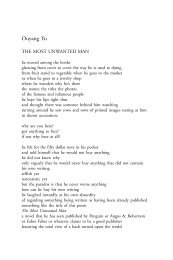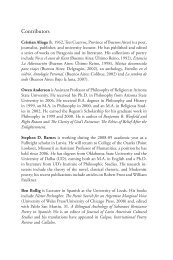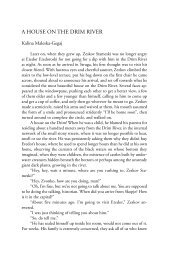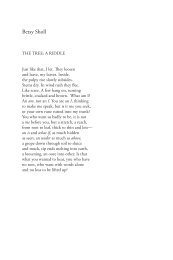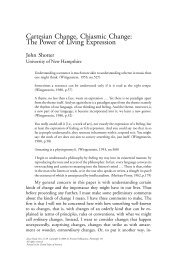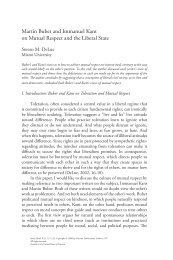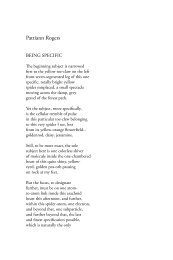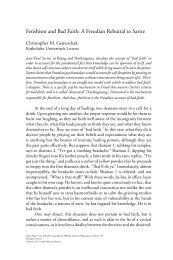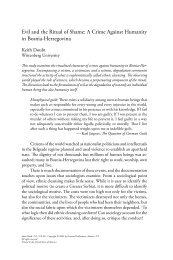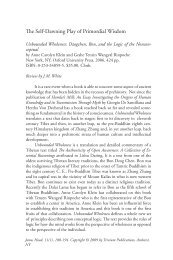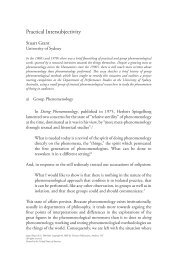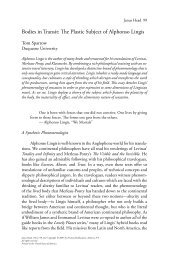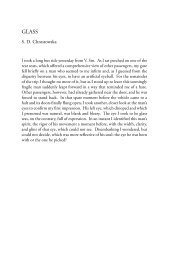Hesse's Steppenwolf: A Comic-Psychological ... - Janus Head
Hesse's Steppenwolf: A Comic-Psychological ... - Janus Head
Hesse's Steppenwolf: A Comic-Psychological ... - Janus Head
You also want an ePaper? Increase the reach of your titles
YUMPU automatically turns print PDFs into web optimized ePapers that Google loves.
146 <strong>Janus</strong> <strong>Head</strong><br />
�e perception of life as a reality of metaphorical reflection is what<br />
characterizes <strong>Steppenwolf</strong> as a psychological comedy. Accordingly, the<br />
transcendence made possible through Haller’s re-education--which may<br />
legitimately be described as an initiation into psychological reality--is not<br />
an overcoming of physical existence but rather the realization of possibilities<br />
which go beyond the stagnant, deadly situation of Haller’s ego domination<br />
and absorption in a literally dual existence. �ese possibilities are opened<br />
because psychological reality is the disruption of the dichotomies and divisions<br />
which had previously structured the <strong>Steppenwolf</strong>’s life. With the<br />
breakdown of the <strong>Steppenwolf</strong>’s split between mind and body, subject and<br />
object, comes the laughter of release and the revivification of the mundane<br />
world provocative of the wonder which accompanies metaphorical psychological<br />
reflection.<br />
In creating this account of psychological life, Hesse’s art and vision<br />
are one. By making his readers experience metaphorical reality through<br />
double perception, Hesse disrupts the very dichotomies from which the<br />
<strong>Steppenwolf</strong> himself must gain release. Hesse realized that to some extent,<br />
we are all Steppenwolves caught in the divisions between subject and object,<br />
inner and outer, mind and matter. We are all subject to the homelessness of<br />
modernity. Little wonder that the 1960s’ counter-culture, a generation who<br />
felt most acutely that its society was held by a materialism that was dead<br />
and a spirituality which was empty, should be attracted by <strong>Steppenwolf</strong>.<br />
To endure life, one must embrace it through humor and imagination.<br />
To overcome alienation, one must reorient one’s perception of reality, not<br />
take refuge in despair. �is is the vision of human life that places <strong>Steppenwolf</strong><br />
within the comic tradition. It is as well the re-visioning of contemporary<br />
reality which has given Hesse’s psychological comedy its claim to authentic<br />
cultural relevance.<br />
References<br />
Bolby, M. (1967). Herman Hesse: His Mind and his Art. Ithaca: Cornell<br />
University Press.<br />
Cowan, L. (1984). “Introduction: �e <strong>Comic</strong> Terrain.” In L. Cowan (Ed.)<br />
�e Terrain of Comedy (pp. 1-18). Dallas: �e Dallas Institute of Humanities<br />
and Culture.<br />
Freedman, R. (1973). “Person and Persona: �e Magic Mirrors of <strong>Steppenwolf</strong>.”<br />
In T. Ziolowski (Ed.), Hesse: A Collection of Critical Essays



